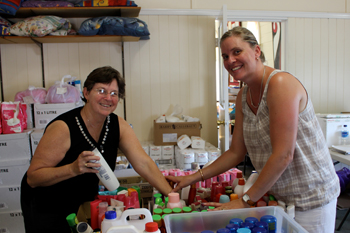
THERE WAS a Sunday afternoon joke among hungry college students attending the North Rockhampton congregation in the late 1970s and early 80s: “I hope there’s as much tea as fellowship at the fellowship tea.”
Food and the gathering of believers have gone together since time immemorial. Killing a goat isn’t so common in Queensland these days, although it remains the done thing in Timor Leste.
Freshly dug yams and baked fish is a memorable after church lunch for newcomers in Bougainville.
In the suburbs there’s many a welcome over an egg sandwich, tuna mornay, and the ‘ole spag bol’.
This is no trifling matter.
There’s a good reason why even people who may not share our experience of faith, feel welcome at café church, pot-luck dinners and fellowship teas.
The act of sharing something basic and essential speaks volumes about what is essential for our spirits.
That which sustains us should also delight us and not only as individuals, but by joining us in community.
To “put your feet under the table” is to become family.
There is promise, commitment, generosity and blessing.
Around the table there may also be robust conversation and challenging ideas as people share their stories.
It’s no wonder we speak in terms of Jesus inviting us to his table.
It is with wonder that we break the bread together.
Writing in The Distributist Review, G.K. Chesterton scholar and author, Dale Ahlquist, put it this way: “Food is a necessity
as well as a pleasure.
Because it is so basic, it finds itself at the centre of economic policies, but also philosophical ideas and even religious practices.
“Economics is not about money but rather about the struggle for daily bread.
“But the swallowing of food transcends the crunching of numbers.
“Eating becomes a moral act when we make choices about how we produce, sell, and buy our food, taking into account how others are aff ected by our decisions.
“It becomes a religious act for even deeper reasons.
Fasting and feasting mark the liturgical calendar.
We have the opportunity to demonstrate that we are more than our animal appetites but also community that we should enjoy God’s gifts and ‘taste and see that the Lord is good’. ”
By the way, if you’re tired of egg sandwiches, check the Cleveland Cowboy Church next time you’re in the United States.
A recent notice said: “We had a BIG pot of chilli left over from the Jubilee and plenty of fixins.
So come ready to stay after church for some food and fellowship.”
Photo : Moggill Uniting Church became the centre of the during the January flood. Church member Cheryl and community member Annabelle sort food for emergency relief. Photo by Catherine Solomon
 JourneyOnline
JourneyOnline






